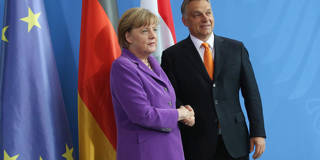 Sean Gallup/Getty Images
Sean Gallup/Getty Images
摇着民粹主义尾巴的德国狗
华沙—一开始,9月德国联邦选举的最大输家是一个法国人和一个卢森堡人:法国总统马克龙和欧盟委员会主席容克。他们有各自的欧盟改革计划,都着眼于从欧盟开始加深一体化。
容克呼吁所有非欧元成员国都接受单一货币,甚至还给出了路线图。与此同时,马克龙呼吁建立一个有共同预算的更加深入一体化的欧元区,共同预算部分可以用泛欧盟金融交易税筹集(目前只有法国和英国征收金融交易税)。他还呼吁任命一位欧元区财政部长,并采取措施协调各成员国的公司税和最低工资。
但容克和马克龙的计划需要德国的配合。而德国对于欧盟层面的改革没有什么热情,因为它是现状的受益者。在共同财政政策缺位的情况下,共同货币政策制造了一个非常有利于德国的失衡。作为欧元区最大经济体,德国和较穷的成员国共用一种货币,享受着人为提高的出口竞争力。
https://prosyn.org/c4nS9qEzh
To continue reading, register now. It’s free!
Register Now
Already have an account?
Log in



华沙—一开始,9月德国联邦选举的最大输家是一个法国人和一个卢森堡人:法国总统马克龙和欧盟委员会主席容克。他们有各自的欧盟改革计划,都着眼于从欧盟开始加深一体化。
容克呼吁所有非欧元成员国都接受单一货币,甚至还给出了路线图。与此同时,马克龙呼吁建立一个有共同预算的更加深入一体化的欧元区,共同预算部分可以用泛欧盟金融交易税筹集(目前只有法国和英国征收金融交易税)。他还呼吁任命一位欧元区财政部长,并采取措施协调各成员国的公司税和最低工资。
但容克和马克龙的计划需要德国的配合。而德国对于欧盟层面的改革没有什么热情,因为它是现状的受益者。在共同财政政策缺位的情况下,共同货币政策制造了一个非常有利于德国的失衡。作为欧元区最大经济体,德国和较穷的成员国共用一种货币,享受着人为提高的出口竞争力。